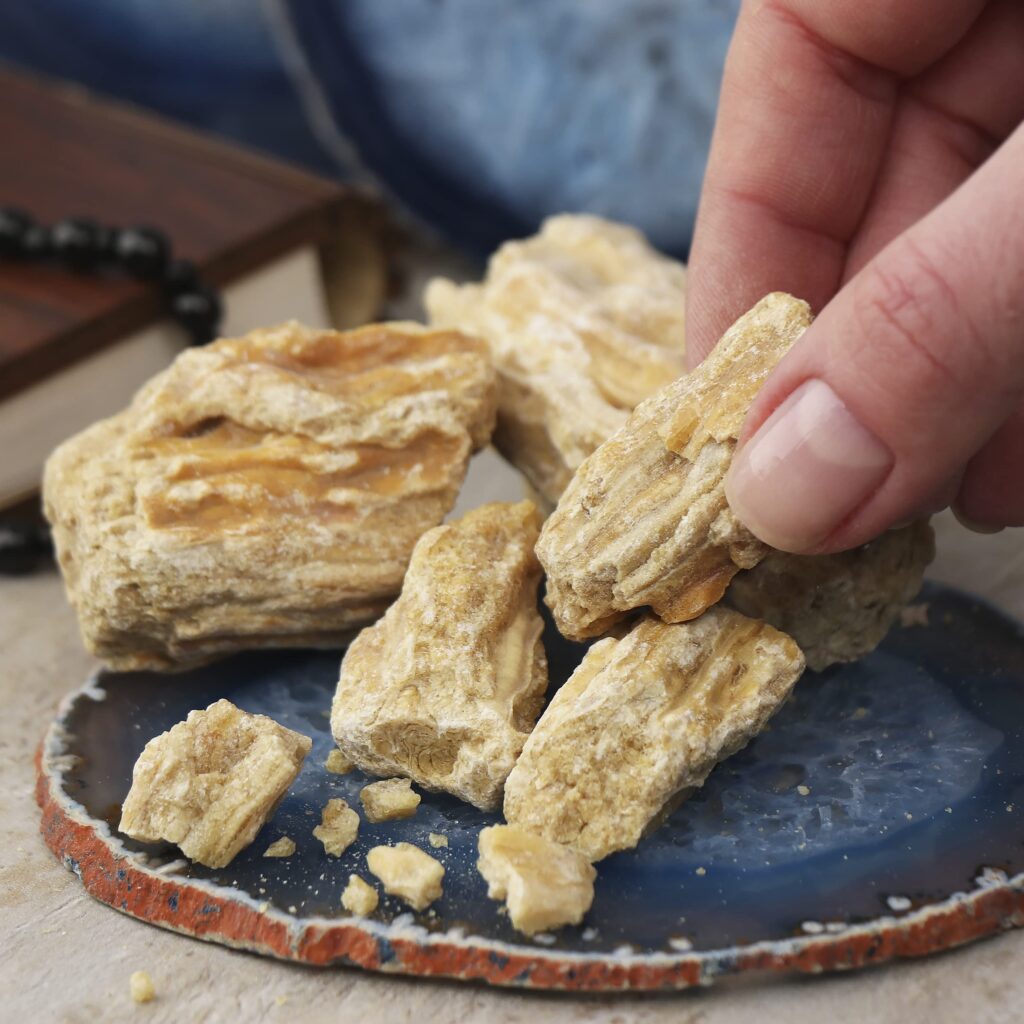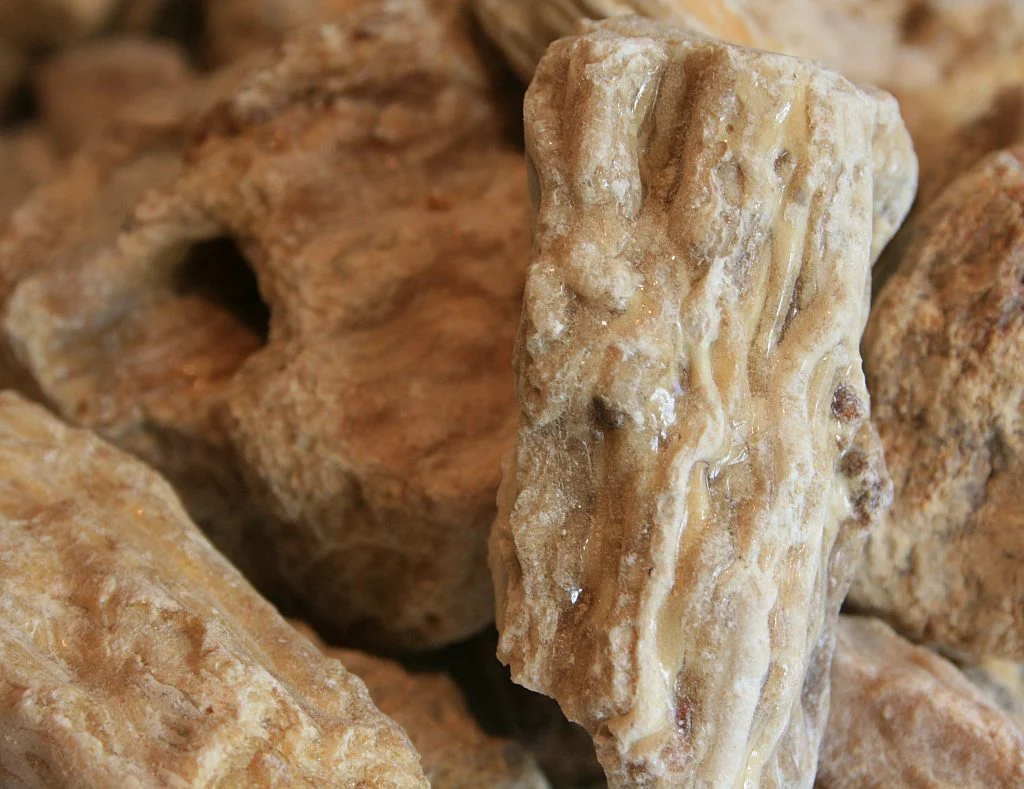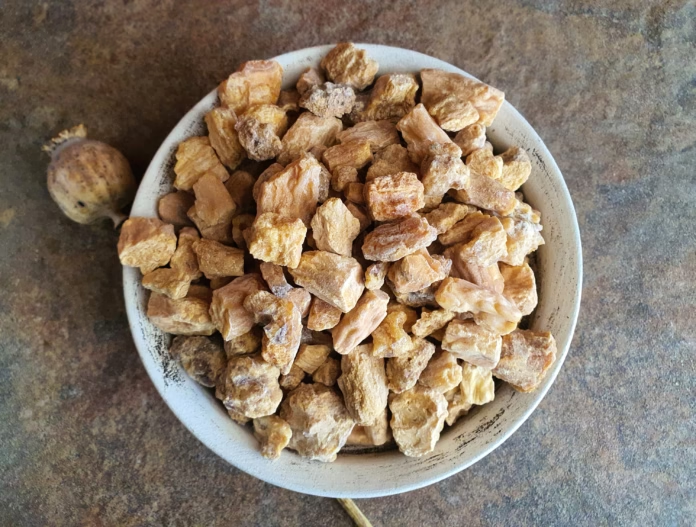INTRODUCTION:
Ral Safaid (رال سفید) is a white or pale-yellow resin obtained from the Sal tree (Shorea robusta), a large deciduous tree native to the Indian subcontinent. This natural gum exudes from the bark when the tree is wounded and solidifies upon exposure to air. In traditional systems of medicine like Ayurveda and Unani, Ral Safaid is valued for its anti-inflammatory, astringent, and wound-healing properties. It is commonly used in external applications to treat skin problems, wounds, and inflammation, and is also found in herbal dental care products. While it is a natural remedy, it should be used with care and preferably under the guidance of a qualified herbal practitioner.

English: Sal Resin / White Resin
Urdu: رال سفید
Hindi: साल की राल / सफेद राल
Punjabi: سال رال / سفید رال
Sanskrit: शाल रस
Bengali: শাল গাছের রেজিন
Tamil: விறகு பிசின்
Telugu: చల్ల చెక్క రाळు
Malayalam: ചാലിൻ റസിൻ
Marathi: सालाचा डिंक
Kannada: ಸಲ ರಾಳು
Arabic: صمغ شجرة السال
Persian (Farsi): صمغ سفید
Scientific Name: Shorea robusta (Sal Tree)
HEALTH BENEFITS:

Wound and burn healing:
When applied topically, sal tree resin acts as a natural antiseptic to help treat cuts, burns, and ulcers by stopping bleeding, preventing infection, and speeding up the healing process. Research has shown that ethanolic extracts of Shorea robusta resin have significant wound-healing properties.
Pain and inflammation relief:
The resin contains anti-inflammatory and pain-relieving compounds that may help reduce inflammation and soreness associated with arthritis, joint pain, and muscle aches. Some studies show that extracts from sal resin have analgesic effects.
Immune system support:
With its antimicrobial and antioxidant properties, sal resin may help boost the immune system and protect the body from infections.
Respiratory relief:
The fumes from burning sal resin, which is also used as incense, have been traditionally used to help clear chest congestion and blocked noses.
Digestive health:
In traditional practices, the astringent properties of sal resin have been used to help manage diarrhea and dysentery.
Female reproductive health:
The resin is sometimes used in traditional medicine to help manage conditions such as excessive menstrual bleeding (metrorrhagia) and vaginal discharge (leucorrhea).
Treats skin infections:
Due to its antibacterial and astringent effects, the resin is used topically to treat various skin infections like acne, eczema, boils, and blisters.
Reduces blemishes and scars:
A paste made from sal resin can be applied to marks and scars to help lighten them over time.
Controls excessive sweating:
Sal resin has a pore-tightening effect that helps reduce excessive sweating and body odor when applied to affected areas.
Acts as a natural cosmetic ingredient:
The resin is used in cosmetics for its ability to smooth the skin and provide a pleasant feel.
SIDE EFFECTS:

Constipation:
Due to its astringent properties, high oral doses of Ral Safed can cause constipation and hardening of stools.
Gastrointestinal issues:
Overconsumption can lead to digestive discomfort.
Rashes:
Some people may experience allergic skin reactions or sensitivity, especially when the resin is applied topically.
Reduced blood sugar:
Ingestion of Sal tree products may lower blood glucose levels. Those with diabetes should monitor their blood sugar closely if using this remedy.
HOW TO USE:
For Wound Healing (Zakhm or Jalay):
Use: Make a fine powder of Ral Safaid and mix it with coconut oil or rose water.
Apply: Gently apply on cuts, burns, or wounds to promote healing.
Frequency: 1–2 times daily until healed.
For Skin Problems (Daag, Dhabbe, Khujli):
Use: Mix powdered resin with multani mitti or sandalwood powder and a few drops of rose water.

Apply: Use as a face or body pack for rashes, pimples, or itching.
Leave for: 15–20 minutes, then rinse with lukewarm water.
For Joint or Muscle Pain:
Use: Mix Ral Safaid powder in warm mustard or sesame oil.
Apply: Massage on painful joints or muscles.
Note: Acts as a natural anti-inflammatory.
For Dental Care (Masuron ki Mazbooti):
Use: Mix a pinch of Ral Safaid powder in herbal tooth powder.
Brush: Use gently on gums to strengthen and reduce swelling.
Precautions:
Only for external use unless a qualified herbalist advises internal use.
Do not apply on deep or infected wounds without medical guidance.
Always do a patch test to check for skin allergies.




